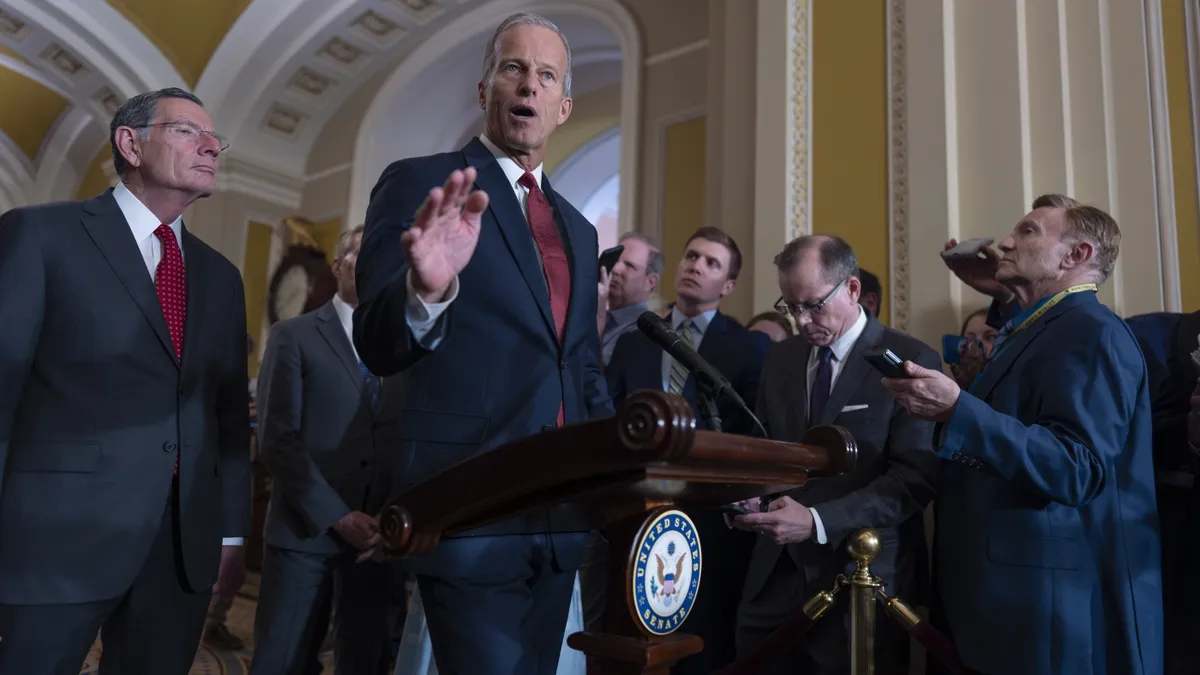
Senate Republicans are currently racing against the clock to fulfill President Trump's demand for the passage of his domestic agenda bill by July 4th. As they navigate through significant hurdles within the GOP conference, several major sticking points have arisen, particularly concerning funding for rural hospitals. While Senate committee leaders have made substantial revisions to the bill in recent days, the ongoing disputes over key provisions threaten to derail the timeline set by the President.
The primary obstacle facing Senate GOP leaders is the issue of funding for rural hospitals, which has emerged as a critical roadblock. Additionally, Senate leaders are awaiting confirmation on whether the major tax provisions included in the bill adhere to strict Senate rules. These rules dictate what can be included in the legislation and still secure passage with a simple majority vote. The Senate parliamentarian, a non-partisan member of the professional staff, is currently reviewing these elements to ensure compliance with regulations, including the requirement that each provision directly impacts the budget. Already, several provisions from the House version, such as a ban on nationwide judicial injunctions, have been eliminated during this review process.
Initially, Senate leaders aimed to unveil their revised bill early this week. However, the ongoing debate regarding hospital funding, tax provisions, and other contentious issues threatens to undermine Senate Majority Leader John Thune's objective of passing the bill within the week. Thune can only afford to lose three GOP votes to ensure the bill's passage, making consensus crucial.
Among the most contentious topics within the bill is Medicaid, a program providing health coverage to low-income individuals and a major healthcare payer in the United States. A significant point of contention is a proposed directive requiring states to reduce the tax imposed on Medicaid providers from 6% to 3%. Critics argue that this tax is essential for the funding structure in many states, and its reduction could pose severe challenges for rural hospitals that depend on those funds. This tax is part of a complex formula determining federal funding received through the joint federal-state Medicaid program.
Mehmet Oz, who oversees the Medicaid program under Trump, recently met with Senate Republicans to advocate for the proposed changes. He described the bill as the most ambitious healthcare reform initiative in U.S. history, arguing that the adjustments would control the program's growth and introduce new work requirements to safeguard it for the most vulnerable populations. However, some Republicans, including Sen. Josh Hawley of Missouri, express concerns that the proposed changes could lead to prolonged negotiations with the House, as the original House bill was negotiated under Trump’s guidance.
In an attempt to address concerns from Republican senators like Hawley, the Senate Finance Committee has proposed a new compromise. This plan aims to establish a stabilization fund for rural hospitals, allocating $15 billion over five years to assist states in need. However, many senators, including Sen. Susan Collins from Maine, argue that this amount falls significantly short of the estimated $100 billion needed to adequately support rural healthcare facilities. Collins emphasized the importance of taking the necessary time to navigate these complex issues rather than rushing to a vote.
Sen. Thom Tillis from North Carolina echoed these sentiments, warning that addressing the challenges posed by the bill would be costly. He pointed out that states may struggle to compensate for the funding reductions outlined in the legislation, which could lead to severe consequences for rural healthcare access. With estimates projecting a $38.9 billion funding cut in North Carolina over the next decade, Tillis cautioned that states would need to consider measures like repealing Medicaid expansion to balance their budgets.
Other Senate Republicans are expressing apprehensions about the potential impact of Medicaid changes, fearing that significant cuts could shift costs to states responsible for covering low-income, elderly, and disabled patients reliant on the program. Sen. Rick Scott from Florida leads a faction of conservatives advocating for deeper spending cuts, insisting that any bill must reflect fiscal responsibility. Likewise, Sen. Ron Johnson from Wisconsin has called for a rollback of spending to pre-pandemic levels, stressing that the proposed legislation could contribute to the deficit.
Fiscal conservatives in the Senate have also raised alarms about potential changes to energy tax credits. The GOP's decision to roll back or eliminate several credits included in the Inflation Reduction Act has frustrated some members of their own party, who believe that constituents and businesses relying on these credits would be adversely affected.
Even if Thune successfully navigates the internal Senate challenges, he faces opposition from various factions of House Republicans. A significant point of contention revolves around the state and local tax break (SALT), which House GOP members from high-tax districts in New York and California are adamant about preserving. They have warned that they will oppose the bill if it passes the Senate without this crucial provision.
As negotiations continue, Sen. Markwayne Mullin from Oklahoma indicated that discussions with the SALT caucus are progressing, though he remains skeptical about reaching a universally acceptable solution. Nonetheless, he believes that a compromise on Medicaid and SALT would pave the way for the bill's passage. Thune has consistently referred to Trump as the "closer" in rallying support for this extensive legislation, and by adhering to the timeline set by the President, he hopes to apply political pressure that will ultimately compel Republicans to unify behind the package.